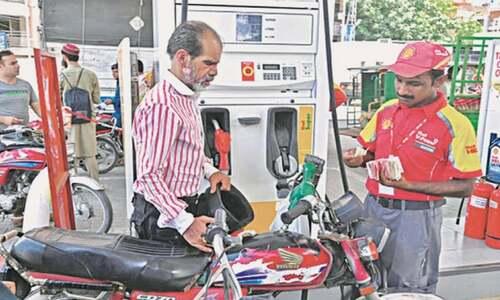ISLAMABAD: The top official from the United Nations Development Programme (UNDP) in the Asia-Pacific region has said that low tax-to-GDP ratio is critical for development in Pakistan and the government should look into the taxation issue, which is complicated as well as sensitive.
UN Assistant Secretary-General and Regional Director of UNDP for Asia and the Pacific Haoliang Xu upon the conclusion of his four-day visit to Pakistan said, “if Pakistan does not have enough resources needed for investment in education, health, infrastructure and social protection then the Pakistani population cannot expect the government -- both federal and provincial -- can deliver on their expectations.”
Talking to Dawn, Mr Xu regretted that the tax-to-GDP ratio, which used to be 13 to 14 per cent in Pakistan, has gone down to 10pc. Why the tax-to-GDP ratio is persistently low? The Pakistanis will have to look into it, he said.
Citing the example of Bangladesh, the UNDP official said Bangladesh is maintaining the tax-to-GDP ratio between 13 to 14pc and its government is now aiming to raise 18pc of resources from local sources to fund the five-year development plan.
Pakistan needs to follow the regional countries, which have done a good job in mobilising resources domestically. African countries too were maintaining tax-to-GDP ratio at 18pc, the UNDP regional official emphasised.
For better implementation of a national development vision and to achieve targets of Sustainable Development Goals (SDGs), Pakistan needs huge financing like any other country. However, the government alone cannot provide financing, and there is a need that the private sector comes forward, said Mr Xu.
As part of financing for development, the size of the national budget is growing with the passage of time every year. Even with such a growth, there is small part of resources needed for the achievement of all the goals including economic growth, job creation and poverty reduction.
Pakistan also needs foreign direct investment and leverage the official development assistance. The UNDP official stated that China-Pakistan Economic Corridor (CPEC) can be seen as part of financing for development, which is quite significant.
The UN Assistant Secretary-General when asked about the role of CPEC in the development of Pakistan said the corridor projects will have a positive impact on Pakistan and be mutual beneficial for the two countries.
Quoting statistics, he said over 100,000 local jobs have been created in different countries in various infrastructure projects. “I have no doubt CPEC will create jobs in Pakistan, increase connectivity, trade and increase people to people contact. Energy and infrastructure projects will be of economic benefit for the two countries,” he said.
Mr Xu made it clear that CPEC infrastructure projects are investment projects, and not aid projects. Sometimes there is a misunderstanding that this is Chinese aid but it is clear these are mutually beneficial projects.
About the implementation of SDGs, the UNDP official sees encouraging signs of implementation of the global development agenda. “Pakistan is taking the international goals under SDGs very seriously; they are government’s national goals.
Both the federal and provincial governments have taken concrete steps to match SDGs with national and provincial frameworks. They are further mainstreaming these goals into the local development plans.
Mr Xu said that Pakistan has made a lot of progress in terms of setting up systems and mechanisms for monitoring progress on the implementation of SDGs. The Pakistan Bureau of Statistics (PBS) was working for the adaptation of national service to reflect some of the needs of SDG indicators. PBS was also working with provincial governments to harmonise with national service in order to avoid duplication of work.
He said that UNDP is providing support to the government for the preparation of a ten year development plan for The Federally Administered Tribal Areas (FATA). The ten-year socio-economic plan for FATA will bring development at par with the rest of the country, he said.
UNDP Country Director, Ignacio Artaza, who accompanied Mr Xu, explained that a future investment plan for FATA was also being developed. He said concrete actions are part of the plan including rehabilitation work, irrigation channels, roads, schools and health facilities for which UN agencies like Food and Agriculture Organisation, United Nations Children’s Fund, and The World Food Programme will be involved.
Published in Dawn, June 18th, 2017











































